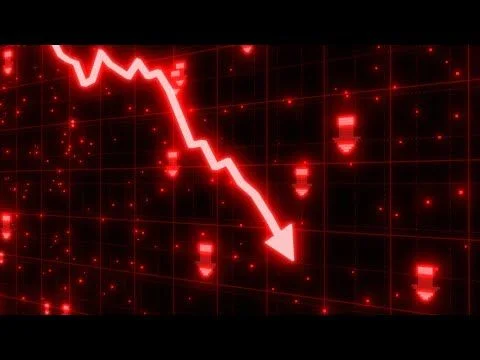
The Indian market is crashing under pressure! Discover 5 critical reasons for this nosedive, from geopolitical threats to massive foreign outflows. Equip yourself with the knowledge to make better investment decisions during this crisis.
Why the Indian Market is Crashing Now
The approaching U.S. presidential elections also add to the global market uncertainty, as investors remain cautious of the potential political shifts that could influence international trade and economic conditionsFurthermore, the Indian Rupee’s decline is fueling concerns about the country’s fiscal deficit, which is putting additional pressure on market performance

The recent downturn in the Indian stock market has left many investors worried and wondering why this is happening. Let’s break down the main reasons behind the current market crash.
Global Factors Impacting the Market
Global factors significantly influence the Indian stock market, and several international events are currently affecting its performance. One of the primary drivers is global monetary policies. For example, the U.S. Federal Reserve’s actions—such as interest rate hikes—directly impact investment flows. Higher interest rates in developed economies like the U.S. tend to attract investors, pulling funds out of emerging markets like India, which offers relatively lower returns

- Geopolitical Tensions: Ongoing conflicts in the Middle East, especially between Israel and Hezbollah, have caused global instability. When such conflicts arise, investors often become nervous and start pulling money out of riskier investments like stocks.Geopolitical tensions can have a significant impact on the Indian stock market. Global markets are highly interconnected, and events in one part of the world can quickly influence other regions. For India, geopolitical events—like conflicts, trade wars, or major policy decisions from global powers—can create an environment of uncertainty that leads to increased market volatility.
- US Presidential Election Uncertainty: The US election is being watched closely worldwide. The tight race between candidates affects global economic policies, which can make investors cautious and lead to market drops.As the 2024 U.S. presidential election approaches, markets may experience heightened volatility, with investors closely monitoring key events, debates, and polls. Policies proposed by presidential candidates, especially regarding trade, taxes, and foreign relations, can significantly affect global business sentiment. For example, if there is a potential change in policies regarding trade agreements, tariffs, or global alliances, businesses may alter their strategies, which can have ripple effects on markets worldwide, including India.
Domestic Factors
Changes in India’s economic policies, especially related to inflation control, interest rates, and government fiscal policies, also have a direct impact. The Reserve Bank of India’s (RBI) monetary policy, for instance, affects bank lending rates and credit availability, influencing business activities and market sentiment. If inflation rises or interest rates increase, it could dampen consumer spending and reduce corporate profitability, leading to a decline in stock prices

- High Valuations: The Indian stock market has been quite expensive recently. When stock prices are high, investors may choose to sell their holdings to make a profit, which can lead to a market fall.
- FII (Foreign Institutional Investor) Outflows: Foreign investors have been taking money from the Indian market. A significant part of this money flows into China, which has become more attractive due to new government stimulus measures. This capital outflow puts pressure on Indian stocks.
- Disappointing Corporate Earnings: Many companies in India have not posted strong financial results for the September quarter. Sluggish profit growth and higher costs are making investors worried about future returns.
Here’s a simple flowchart to understand the reasons:
Global Issues
↓
- Geopolitical Tensions
- US Election Worries
Domestic Problems
↓
- Expensive Market (High Valuations)
- Money Leaving India (FPI Outflows)
- Poor Corporate Results
Combined Effect
↓
Market Crash3. How It Affects You
The recent crash in the Indian stock market can significantly affect individual investors and the broader economy. For retail investors, the immediate impact is often a reduction in the value of their investments. Stock portfolios, mutual funds, and ETFs may see declines, which can be concerning for those who rely on these assets for short-term goals or retirement savings. While long-term investors may weather the storm with a focus on future recovery, the immediate losses can still feel overwhelming. Additionally, a market downturn can signal broader economic slowdowns, which may lead to lower corporate earnings, layoffs, or hiring freezes, particularly in sectors closely tied to the stock market like finance and technology.

When the market crashes, it can make your investments lose value. This may cause anxiety, but remember: market ups and downs are part of investing. If you’re investing for the long term, don’t panic over short-term changes.
When Indian stock market bounce back?
Predicting when the Indian stock market will bounce back is now more challenging due to its dependency on multiple factors, which including domestic and global influences. Historically, the Indian market has shown resilience and recovery after sharp corrections, especially when the economy remains strong and liquidity continues to flow. Experts have pointed out that despite recent turbulence, such as the impact of global inflation concerns and geopolitical tensions, India’s economic fundamentals remain robust, with strong growth projections for the upcoming fiscal years. Furthermore, domestic investors are still bullish on India’s long-term potential due to its favorable growth trajectory, stable inflation, and currency strength.
Conclusion
The Indian stock market’s recent crash is unsettling, but understanding the factors driving this downturn can help you respond wisely. From global geopolitical tensions and the uncertainty of the US presidential election to domestic issues like high valuations and disappointing corporate earnings, these elements have created a perfect storm of fear and volatility.
However, history has shown that markets eventually recover. It’s crucial to stay calm, avoid knee-jerk reactions, and think about your long-term financial goals. If you’re feeling unsure, consider consulting a financial advisor to tailor an investment strategy that suits your situation. Remember, in the world of investing, patience and a well-thought-out approach often pay off over time.
The Indian stock market’s recent downturn can be attributed to several critical factors that are impacting investor confidence. Firstly, the selling by Foreign Institutional Investors (FIIs) has been a major cause. These large investors have pulled out substantial amounts of capital, leaving a significant gap in the market’s liquidity, which has led to downward pressure on stock prices.
Secondly, disappointing corporate earnings for Q2 2024 have added to the pessimism. Several major sectors, including IT and consumer goods, reported results below expectations, reflecting weak business performance. This has made investors wary, especially as growth projections for these sectors have been revised downward.
Another contributing factor is the geopolitical uncertainty, particularly in the Middle East, which has created a global ripple effect. Investors, fearing the potential for escalating tensions, have moved their investments away from emerging markets like India. This uncertainty is compounded by concerns about global economic stability, especially with the U.S. presidential elections on the horizon.
Additionally, the weakening Indian Rupee has sparked fears about the country’s fiscal health, particularly with respect to the growing fiscal deficit. A depreciating currency often raises inflation concerns, which can make domestic investments less attractive and further strain market sentiment.
Lastly, domestic political uncertainties, particularly ahead of the Maharashtra Assembly elections, have led to investor caution. Investors are closely watching the outcomes of these elections as a reflection of the government’s political strength and future economic policies.
In conclusion, the combination of global and domestic uncertainties has created an environment where investor sentiment is low, leading to significant volatility in the Indian stock market. While these factors are causing short-term turbulence, the market may stabilize as these concerns resolve over time.
FAQs About the Indian Market Crash
Q: Should I sell all my investments now?
A: It depends on your financial goals. If you’re investing for the long term, selling now might not be a good idea. However, if you need money soon or are worried, consider consulting a financial advisor.
Q: Is this crash permanent?
A: No, market crashes are usually temporary. The market often rebounds after some time. It’s essential to stay patient and not make hasty decisions.
Q: Why are foreign investors pulling money out of India?
A: Foreign investors are shifting their funds to markets like China, which have become more appealing due to economic stimulus packages. Also, high valuations in the Indian market make it less attractive right now.
Q: What should I do as a new investor?
A: Stay calm and review your investment plan. If you are investing for the long term, this could be an opportunity to buy good stocks at lower prices. Always seek professional advice if you’re unsure.
This crash may be concerning, but remember that investing involves riding through market ups and downs. Stay informed and make choices aligned with your financial goals.
For More Information, Visits:- Why is the Indian Share Market Down Today
Also Check This Blog:- 11 Key Basics of the Indian Stock Market for a Strong Start – Knowledge kendra



